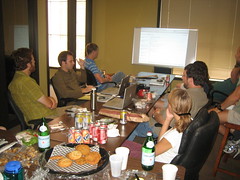Worldchanging Book Party
October 13th, 2006 by Team Member
by Jeremy Faludi
In addition to contracting for Exbiblio as their green design consultant, I consult for other companies and write for Worldchanging.com, a green design / technology / policy journal. Worldchanging’s mission is to find and share tools, models and ideas which offer solutions to the planet’s biggest problems. We’ve won multiple awards and have hundreds of thousands of readers around the world, and our book–Worldchanging: A User’s Guide for the 21st Century–brings together the best, most hopeful and most effective ideas we’ve found so far. I was just one of many authors who contributed; the subjects include everything from green product design to megacities to international development, from energy to water to culture and politics, from wood stoves to biotech and nanotech.
The Seattle book release party will be October 28, 7:30pm, at Town Hall, $5 at the door. Bruce Sterling and our executive editor, Alex Steffen, will be on stage discussing the future of sustainability; then a reception and after-party will follow. It’ll be a lot of fun, if you like smart green futurists and such, so come check it out!
Feel free to forward this invitation widely. If you don’t live in Seattle, come to our book parties in other cities, such as Portland, Vancouver, New York, San Francisco, etc. (Details here.)
Hope to see you there!
Jeremy Faludi
design, consulting
www.faludidesign.com
www.worldchanging.com



 This is a story about a scanner device that was mentioned in an anonymous comment on this blog. I thought it was worth reading up a little more about it. It’s a failure story – but there’s always something to be learned from others’ mistakes (and your own!).
This is a story about a scanner device that was mentioned in an anonymous comment on this blog. I thought it was worth reading up a little more about it. It’s a failure story – but there’s always something to be learned from others’ mistakes (and your own!). 